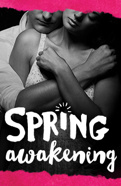Spring Awakening Choreographer Spencer Liff on Channeling the Golden Age of Broadway in a Modern, Inclusive Era
Having made the leap from Broadway chorus boy to choreographer, Spencer Liff is bringing back the Golden Age of dance with a modern sensibility. The man behind Spring Awakening’s American Sign Language-infused movement reflects on the careers of such artists as Gower Champion while making strides to advance both his career and the language of dance.
“I didn’t want to wait until I couldn’t dance anymore to start choreographing,” Liff told Broadway.com. While he has begun to direct regionally, he’s focusing on dance before making a full switch to director-choreographer (like Champion). Until then, his moves are everywhere.
“It seems like in recent years, choreographers haven’t been as crossover as they used to be,” Liff observed. “Fosse would go and make a film a year, a Broadway show and then a bunch of variety TV specials. So I would like to bring that back and not have to choose.”
And choose he doesn’t. In the past year, Liff has choreographed for stage (Spring Awakening), TV (Best Time Ever with Neil Patrick Harris) and film (Speech & Debate). “My brain sees things in camera shots,” he explained. “Even when on a stage, I shoot it in my head the way I would if it were going on film. I love working in all three mediums.”
While Liff is indeed part of the movement to bring back the omnipresent career paths of director-choreographers, he’s doing so with full awareness of the contemporary responsibility of inclusiveness and representation in art.
“I love people like Steven Hoggett, and their ability to work with all different kinds of body types and ages,” he said when asked about fellow choreographers he admires. “That is really 10 times harder than having amazing dancers in the room who you tell to do whatever you want.”
His work on the revival of Spring Awakening is exemplary of that model: How do you incorporate a cast of deaf actors—and their language—into a fully choreographed musical?
“We started from scratch by seeing how a deaf cast can match a rhythm. We’d stomp our feet around in a circle for hours. Then, we would start to set the signs to those rhythms.” Once the cast was able to follow a beat, it was up to Liff to ensure their language was not compromised by his moves. “It was a constant negotiation of how far we could push it. We cared so deeply that our deaf audience was going to be able to understand the plot. If we needed to stand still and sign to deliver the information, we did.”
Alexandria Wailes, a deaf performer who worked with director Michael Arden previously on Deaf West’s Big River, serves as associate choreographer on Spring Awakening. The collaboration forced Liff to actively learn to sign—and eventually communicate independently with his actors.
“It’s really hard to know somebody when you can’t look at them when you’re speaking. Daniel Durant [who plays Moritz], doesn’t read lips; he doesn’t hear. I remember the first time we had a conversation looking into each other’s eyes. This wall broke down, and he respected me so much more. I felt so much closer to him.”
On top of pending renewals for both So You Think You Can Dance and Best Time Ever, Liff has upcoming Broadway gigs in the works. While the projects he takes on are eclectic, there is a selection process: “I pick things that are totally out of my wheelhouse, to force myself to grow….Next year is going to be crazy. You will definitely see more of me in New York.”
